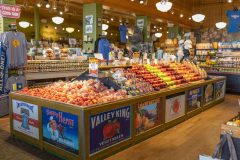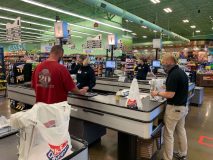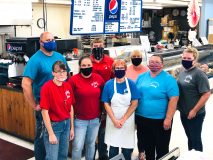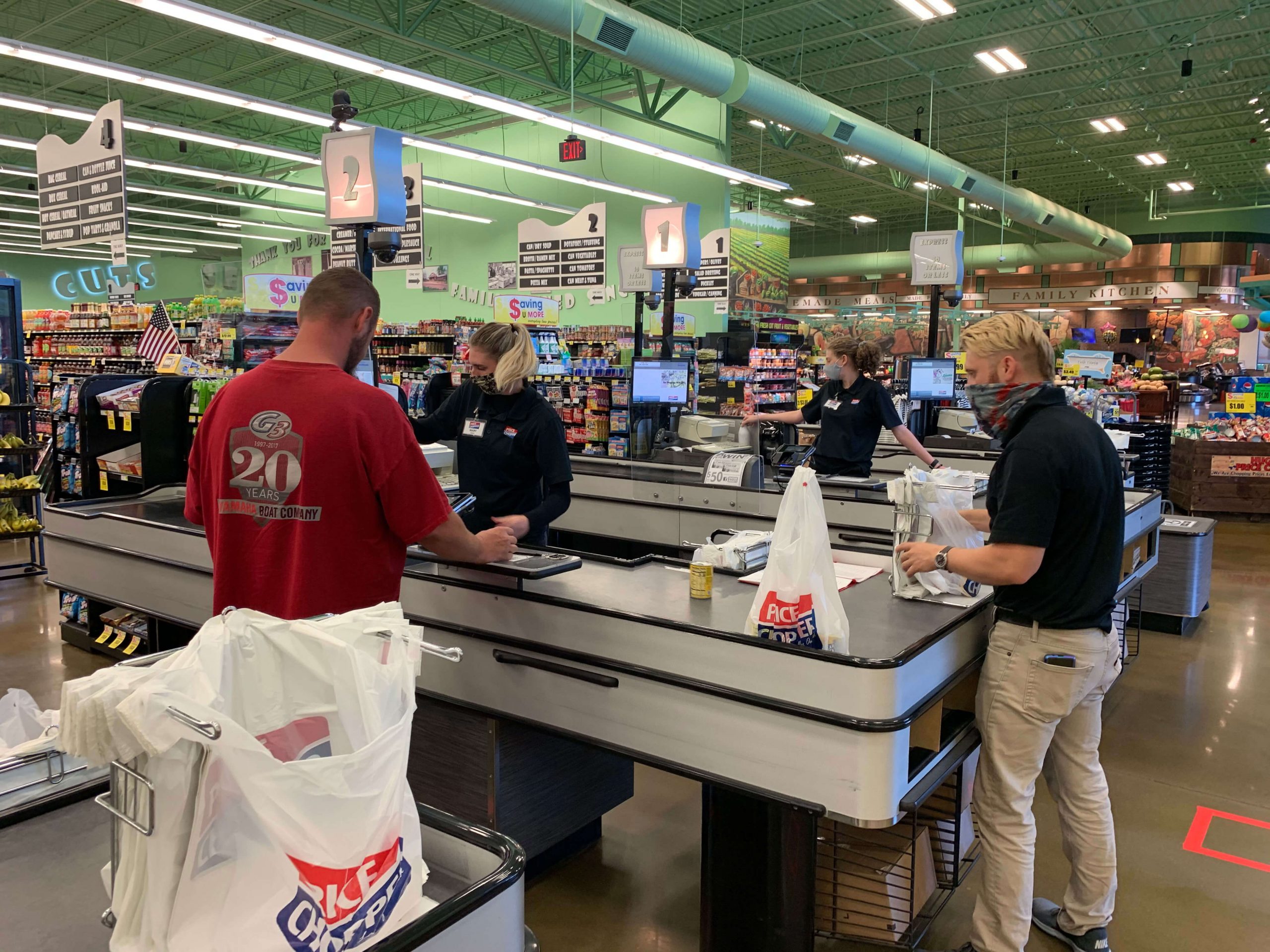by John McCurry, contributing writer
Independent grocers in the southern half of the Midwest have faced COVID-19 pandemic challenges similar to their counterparts in other regions. They have endured many stressful months but also have thrived under challenging conditions.
The Shelby Report recently spoke with three longtime grocers in Missouri and Kansas, as well as the director of a state grocers association, about their experiences and outlook for the remainder of 2020.
Customers ‘appreciate the positive atmosphere’
As the dog days of summer bear down, peaches can provide a welcome break. At Smith’s Market in Hutchinson, Kansas, it’s peaches from a neighboring state populating the produce section in August.

“Colorado peaches are very popular right now, a big draw, especially this year as they had a short crop because of a late freeze,” explained Chris Barnes, Smith’s owner. “The warm days and cool nights increase the sugar content of the fruit, creating a good peach.”
Smith’s, a venerable independent grocery founded in 1933, is known in the Hutchison region for its produce. Also popular this time of year are Rocky Ford Cantaloupes, another Colorado staple. Word is they are especially sweet this year due to warmer than normal days and cool nights.
Pandemic obstacles notwithstanding, 2020 has been a successful year at Smith’s.
“We are pretty upbeat,” Barnes said. “The store has been here 87 years. We are kind of a fun, upbeat environment anyway and our customers enjoy that, especially now, because there are not a lot of fun places to go. It’s a tourist destination, too. We are definitely known for our produce, that’s our big thing.”
Part of the fun at Smith’s is its selection of more than 300 varieties of old-fashioned candies and nostalgic toys. Wooden floors and tin ceilings add to the atmosphere.
Smith’s has implemented the usual pandemic procedures. The store started an online site where customers can order and choose delivery or curbside pickup. Safety measures include sanitizing, mask wearing and encouragement of social distancing.
Many of Smith’s older customers requested home delivery. That prompted Barnes to begin a program earlier than he may have otherwise.
“We also have exceptional employees,” Barnes said. “I was able to hold onto most of my roughly 20 employees. Keeping staff hasn’t been much of an issue. I lost only one person during the beginning. They have all told me they feel lucky to be working. They appreciate the positive atmosphere, maybe now more than ever.”
Barnes is optimistic about the remainder of 2020. People aren’t traveling much, so he surmises they have more to spend locally. And more of them are eating at home, so they are spending more on groceries.
Independent grocers ‘respond to challenges’
Town & Country Supermarket Inc. operates 27 stores in Missouri and two in northern Arkansas under the Town & Country Supermarket, Country Mart, Apple Market and Price Chopper banners. The company started operation in 1962.

“It’s been challenging for sure, between supply issues and employees not feeling well,” said Joe Polizzi, the company’s president and CEO. “Customer demand has certainly increased. But this is what we do. We respond to challenges. That’s the entrepreneurial spirit of the independent grocer.”
While the pace has calmed since March, business volume continues to be high, and higher than this time last year. There also has been the usual pandemic-propelled shift in buying trends toward long shelf-life foods.
People are rediscovering how to cook at home and also cultivating healthier eating habits. Families are eating more meals together, which Polizzi views as a positive pandemic effect.
“The food we have seen affected by different shopping habits are canned goods, rice, beans, pasta – all the staple items that can be stored for a long time and that you can use to make a lot of different meals,” he said.
“People don’t have as many options for eating out, and if money gets tight, those staples come in handy. We definitely do not normally sell so many soups and beans and canned vegetables, especially at this time of year.”
Just one of the company’s 29 stores – Price Chopper in Rolla, Missouri – currently offers online ordering. That’s the highest volume location. Use of the service increased during the early weeks of the pandemic, but since has leveled off. The experience has led the company to accelerate its consideration of adding it at other stores.
Polizzi said independent grocers are able to respond quicker to changes and shortages than some of the big chains. He credits his company’s partnership with cooperative food wholesaler Associated Wholesale Grocers for its success in navigating supply chain challenges.
‘Some freaking out…some not paying attention’
In the Northeast corner of Missouri, Mac’s Super Saver has been serving shoppers in the small town of Kahoka since 1984. Until recently, the area has been spared much of the effects of the COVID-19 pandemic. Store owner Kevin McVeigh said the area recorded its first cases in early August.
“The unfortunate part is that everyone was very diligent during the first part of the pandemic in March and April, but now that it has actually arrived here, people are not taking it as seriously,” McVeigh said. “There is so much information out there. We have some freaking out and some not paying attention at all.
“We are diligently cleaning registers. My cashiers are wearing face masks. We are keeping our distance as much as possible. I did shut down one register for a while to keep people spread out more. I am probably going to go back to that.”
McVeigh noted that in March, when Walmart and other big stores in nearby towns ran out of items, shoppers sought them out in Kahoka.
 “We were able to stay pretty well stocked, as we get our deliveries on different days. But we did have some shortages and we are still dealing with those. And that will probably continue into the foreseeable future.”
“We were able to stay pretty well stocked, as we get our deliveries on different days. But we did have some shortages and we are still dealing with those. And that will probably continue into the foreseeable future.”
McVeigh, who grew up in the business founded by his father, also noted that many of his customers have discovered how much they can save by eating at home. Grilling is popular, as are salads. He anticipates that baking will be big this fall and winter.
McVeigh said his customers enjoy the small-town feel of Mac’s Super Saver, and they appreciate that it is locally owned. They also come for freshly prepared biscuits and gravy and doughnuts.
“We were fortunate,” McVeigh said of Missouri’s pandemic response. “Three businesses in town were shut down – two hair salons and a flower shop. Every other business was considered essential.”
McVeigh anticipates a challenging fall, with potential supply chain issues. To stay ahead of demand, he has begun procuring extra supplies of shelf-stable products such as sugar, flour, rice, beans and canned vegetables and juices.
“I don’t see customers going back to restaurants any time soon,” he said. “I think they are going to keep staying home. We don’t really know what to expect, because it hasn’t really affected our community up until recently.
“If it blows up here in town, people are going to go nuts with purchasing. Then I may have trouble keeping shelves stocked. It hasn’t started yet. It has been increased, but not unmanageable.”
‘Data we’ve gathered for years…no longer applies’

Dan Shaul, state director of the Missouri Grocers Association, said the state’s grocers have overcome pandemic challenges and have met consumer needs thus far. He noted that some trends have accelerated and yet so much is unknown heading into the fall.
“Online ordering and curbside pickup have become trendy,” he said. “I think what we have to figure out is whether the demand is going to remain at the level it is today. When we can go mask free and can come and go as we want, is that still going to be a thing that people want – to give up the experience of going inside the grocery store? Consumers may want to gain back that experience.”
Shaul, who is also a state representative, said the Missouri legislature is out of session and there are no pending matters for next year related to grocers.
Most current grocery-related issues are being dealt with on the local level. He said rules put in place by local health departments and municipalities have presented challenges.
“They have been allowed to put rules in place that go beyond what the state has done,” he said. “It is confusing for business owners and consumers. We want the consumer to feel comfortable shopping, secure and safe.”
Overall, Shaul said, 2020 has been a successful – albeit stressful – year for grocers. The pandemic’s legacy on the industry remains to be seen.
“The data we’ve gathered for years, that told us what to expect in sales for different weeks and months of the year, no longer applies,” Shaul said. “That has all gone out the window. That is why you see shortages of products.
“There are so many factors at play across the industry, from manufacturing to warehousing to retail. Consumer habits are changing drastically and changing almost weekly, depending on what item becomes the focus. The biggest challenge is not knowing what tomorrow holds. We adjusted to delivery, which is great, but what is next?”
The Missouri Grocers Association is a non-profit, statewide organization representing over 1300 members – retailers, wholesalers, distributors, brokers, suppliers, vendors and manufacturers that constitute the grocery industry in the state of Missouri.

